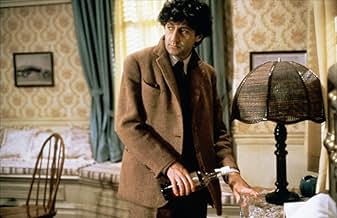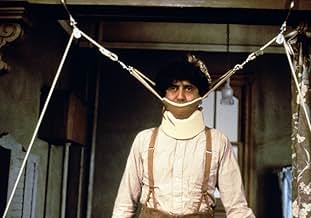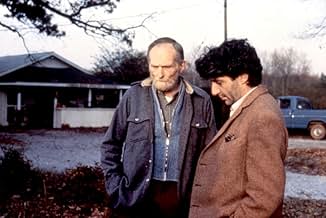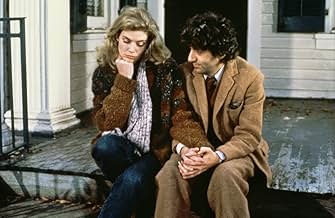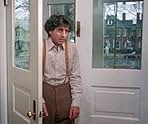VALUTAZIONE IMDb
6,8/10
1396
LA TUA VALUTAZIONE
Aggiungi una trama nella tua linguaA drunken Scottish poet who has not written a word in years feels compelled to regain control of his life and work after meeting a beautiful young woman.A drunken Scottish poet who has not written a word in years feels compelled to regain control of his life and work after meeting a beautiful young woman.A drunken Scottish poet who has not written a word in years feels compelled to regain control of his life and work after meeting a beautiful young woman.
- Regia
- Sceneggiatura
- Star
- Candidato a 2 Oscar
- 2 vittorie e 8 candidature totali
Thomas McGowan
- TV Interviewer
- (as Tom McGowan)
Recensioni in evidenza
This film is probably best known for having launched the screen career of Kelly McGillis, who charmingly and winsomely plays the young female lead in this story, a character whose name is Geneva (she is not Swiss but lives in New England, nor is she a banker). The lead role in this film is played by British actor Tom Conti, who had 24 years of film experience behind him already by this time. He still at this stage had an amazing head of curly hair, like a little boy. Conti has always been a consummate actor, as he proved so spectacularly to a mesmerised British public when he appeared in the remarkable TV series THE GLITTERING PRIZES in 1976, when he became for some time a kind of national cuddly icon. Conti does not play someone called Reuben. Reuben is the name of Kelly McGillis's dog (the real dog's name was Jamie), who plays a crucial role in the film at the ending, which I cannot reveal because of IMDb rules. Conti gives ones of his typically brilliant performances here, albeit of a highly unsympathetic character. He is a serial seducer of women and when he meets McGillis and falls in love for the first time, his habit of non-commitment means that he misses the chance of marrying the girl of his dreams because marrying is just not the sort of thing he wants to do again (having messed up a marriage with a very nice woman the first time round). Conti plays a famous British poet on a lecture and poetry-reading tour of New England, and remember that this is the 1980s when people could still become famous for being poets and they could actually travel round being admired, and rooms full of adoring American women would swoon over them. Conti has insufferable affectations, such as leaving a huge silk pocket handkerchief hanging perilously out of his tweed jacket breast pocket by as much as a foot in length, trailing in the breeze. It is meant to be 'a touch of the poet'. Nobody laughs at his handkerchief, and everybody takes him terribly seriously. He is brilliantly witty and a master of words, entrancing people with his word-play, ironic jokes, endless witticisms, and dazzling verbosity. There is one amazing scene where Conti is persuaded to go to church by Geneva (no, she is not a Calvinist either, but an Episcopalian). He goes up to the altar rail with his hands in his pockets, kneels down, and when the priest comes to him with the host and says: 'The body of Christ', Conti says: 'No thank you, I'm on a diet.' Everything for Conti is an excuse for a joke. The only thing he takes seriously is himself, being hopelessly narcissistic and hence all empty inside. This film is 'kind of a downer', even though it is extraordinarily funny and has an excellent script full of non-stop wit and irony by Julius Epstein and Herman Shumlin, based on a Peter de Vries novel. As a portrait of this type of narcissistic intellectual individual, it is an excellent film, exposing the hollowness of excessive self-love with merciless honesty. It is extremely well directed by Robert Ellis Miller, whose best film in my opinion was the emotionally devastating THE HEART IS A LONELY HUNTER (1968), which was one of the outstanding films of the 1960s and introduced Sondra Locke as a teenager. It should be mentioned that Tom Conti's performance here was so highly regarded when the film came out that he was nominated for an Oscar for Best Actor, and he well deserved that recognition.
This film is a delight from first frame to last. Tom Conti delivers an Oscar-worthy performance, and after seeing this movie you'll be wondering why you haven't seen more of him in the ensuing years. One memorable scene after another and some lines of dialogue which have been indelibly imprinted on my brain ever since. I had a hard time finding this film on tape. A shame that so many inferior movies can be had by the bushel, and gems like this get lost...
REUBEN, REUBEN ****1/2 Tom Conti's role--Gowan McGland, a philandering Scottish poet suffering from writer's block and a depression--is drinking away his fears and tears in wanting something more. He finds fulfillment, however, on one of his gallivanting book tours when he falls in love with a youthful, spirited college student named Geneva. The impressive turns from Conti, Kelly McGillis (debuting here as Gowan's girlfriend), and Roberts Blossom (as Geneva's grandfather) are a must-see, but it's Julius J. Epstein's screen writing that drives the picture. This film, which opened in New York with a bang but petered into obscurity extremely quickly, will intrigue, humor, and often surprise you. Rated R. 1983
Rating System
***** Excellent **** Good *** Fair ** Poor * Bad
Rating System
***** Excellent **** Good *** Fair ** Poor * Bad
Reuben, Reuben! Tom Conti is Gowan McGland - a drunk, burnt-out has-been poet who's been slowly drinking himself to death. So why, as one of his acquaintances asks, does he get to "bed" 'so many women? What do they find so attractive? He's a charmer and a poet. Need we say more. As they said in "Dead Poets Society," why was poetry created - to woo women, of course. As the movie opens, we see him giving a reading of his work to a group of women. Some of them obviously piqued by his naughty little self and the way he scrutinizes himself and others under a microscope to find what really makes us tick and what turns us on, on all levels. He uses this theme of an awakening of self in his work, an arousal of all senses. The film centers on him trying to write and at the same time finding women to.... Enter Kelly McGillis who sees him on a train unable to pay his ticket, so she offers to pay and then bumps into him again later in the little Massachusetts town. Gowan tries to find semblance of order of his life, when he's told by an ex that she's writing a book about her marriage to him and he dictates some feelings into a tape recorder for her use. There's not any real action, but there's plenty of stimulation, great acting by Tom Conti, and extraordinarily insightful writing in this film. I was very impressed with screenwriter Epstein's script. The thoughts and ideas and feelings here were told in such a way as to be clear and simple, while they are representative of deep, multi-layered people and their mores. Epstein has the talent to be succinct. No other film has touched me or made such a profound impact on me, since I discovered "Ordinary People." The ending is a bit abrupt and almost unexpected, almost. But, when I see it again, I'm sure it will seem like it flows together. Everything was thoughtful and deliberate and those who love film like that will fall in love with Reuben, Reuben. But, wait, his character is Gowan McGland. So who or what is Reuben? What does it mean? What DOES it mean?
Tom Conti stars in and was Oscar-nominated for taking the lead role in this blackly comedic drama with literally a dark twist in the tale right at the end. He plays the improbably-named Gowan McGland, a contemporary, feted Scottish poet who hits the lucrative American lecture trail as a distraction from his writer's block. Unfortunately he also hits the bottle, hard, and isn't above disgracing himself with rudely inappropriate behaviour at the various soirées laid on for him and is so down on his luck that he pilfers tips left on tables at restaurants for meals he didn't even pay for in the first place.
With more than one bored, middle-aged American housewife prepared to fall at his feet and do his bidding and an ex-wife looking to profit from her published kiss and tell revelations of their time together, McGland's life is something of a slow-motion train crash. Until that is, Kelly McGillis's much younger pretty student Geneva Spofforth (the character names in this movie are rather silly) takes pity on him, paying a train fare he's either financially or drunkenly incapable of meeting. They hook up, much to the disapproval of her mother, although her more wordly grandfather appears to be on his side.
McGland makes the awful mistake of crossing a wealthy dentist, Joel Fabiani's Dr Haxby, by, naturally, bedding his wife (Conti's real-life wife in fact, Kara Wilson) and compounds his felony by seeking free dental treatment from the very man he's cuckolded. Obviously he's never seen the well-known scene in "Marathon Man" as a painful revenge is extracted more than it's exacted.
It just remains to be seen if Conor and Geneva can make a go of things, especially after she delivers some cataclysmic news to him, but the accidental intervention of man's best friend at the end delivers the last words and coincidentally explains the movie's rather unusual title.
Reportedly based on the later life of the celebrated Welsh poet Dylan Thomas who was similarly accursed, some might say blessed, with drunkenness and debauchery, Conti shines as the tousle-haired McGland who never seems to change his clothes. Cynical and superior, ever ready with an asinine put-down to those he considers beneath him, which is just about everyone he encounters, he's a difficult character to warm to, making me wonder if all poets talk in such a convoluted and pretentious manner as McGland does here. I didn't really buy into Geneva's attraction for him either and found the frankly weird ending as unexpected as it was bonkers.
An unsurprisingly wordy film, peopled with rather unattractive characters, it had the look and feel of what it very much appeared, a film adaptation of a play, Despite good acting by Conti and in particular Roberts Blossom in support as the knowing old grandfather, I found the movie rather detached and mannered and found I couldn't quite connect with it at any level.
With more than one bored, middle-aged American housewife prepared to fall at his feet and do his bidding and an ex-wife looking to profit from her published kiss and tell revelations of their time together, McGland's life is something of a slow-motion train crash. Until that is, Kelly McGillis's much younger pretty student Geneva Spofforth (the character names in this movie are rather silly) takes pity on him, paying a train fare he's either financially or drunkenly incapable of meeting. They hook up, much to the disapproval of her mother, although her more wordly grandfather appears to be on his side.
McGland makes the awful mistake of crossing a wealthy dentist, Joel Fabiani's Dr Haxby, by, naturally, bedding his wife (Conti's real-life wife in fact, Kara Wilson) and compounds his felony by seeking free dental treatment from the very man he's cuckolded. Obviously he's never seen the well-known scene in "Marathon Man" as a painful revenge is extracted more than it's exacted.
It just remains to be seen if Conor and Geneva can make a go of things, especially after she delivers some cataclysmic news to him, but the accidental intervention of man's best friend at the end delivers the last words and coincidentally explains the movie's rather unusual title.
Reportedly based on the later life of the celebrated Welsh poet Dylan Thomas who was similarly accursed, some might say blessed, with drunkenness and debauchery, Conti shines as the tousle-haired McGland who never seems to change his clothes. Cynical and superior, ever ready with an asinine put-down to those he considers beneath him, which is just about everyone he encounters, he's a difficult character to warm to, making me wonder if all poets talk in such a convoluted and pretentious manner as McGland does here. I didn't really buy into Geneva's attraction for him either and found the frankly weird ending as unexpected as it was bonkers.
An unsurprisingly wordy film, peopled with rather unattractive characters, it had the look and feel of what it very much appeared, a film adaptation of a play, Despite good acting by Conti and in particular Roberts Blossom in support as the knowing old grandfather, I found the movie rather detached and mannered and found I couldn't quite connect with it at any level.
Lo sapevi?
- QuizThe Gowan McGland main character in this film and its source, Peter De Vries's 'Reuben, Reuben" novel, was predominantly based on Welsh poet Dylan Thomas. The picture was first released about 30 years after Thomas had passed away in 1953.
- Citazioni
Gowan McGland: Deprived of their support, her breasts dropped like hanged men.
I più visti
Accedi per valutare e creare un elenco di titoli salvati per ottenere consigli personalizzati
- How long is Reuben, Reuben?Powered by Alexa
Dettagli
Botteghino
- Budget
- 3.500.000 USD (previsto)
Contribuisci a questa pagina
Suggerisci una modifica o aggiungi i contenuti mancanti

Divario superiore
By what name was Reuben, Reuben... (1983) officially released in India in English?
Rispondi

